|
|
|
Sort Order |
|
|
|
Items / Page
|
|
|
|
|
|
|
| Srl | Item |
| 1 |
ID:
178889
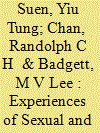

|
|
|
|
|
| Summary/Abstract |
While China's Constitution says everyone is treated equally before the law, employment discrimination continues to exist. This paper breaks new ground by analysing a quantitative survey of more than 10,000 lesbian, gay, bisexual, transgender and intersex (LGBTI) people, the largest dataset of its kind to date in China. Only 5.1 per cent of respondents were completely open about their gender and sexuality at work. More than one-fifth reported experiencing negative treatment in the workplace. Transgender and intersex people reported higher rates of negative treatment, as did respondents with lower educational levels and lower incomes and those residing in towns. Employer policies against discrimination were rare, but when in place, they were significantly associated with less negative treatment. These findings highlight an almost completely neglected segment of the workforce and document discriminatory experiences that could be addressed by changes in discrimination law and by employer policies and practices related to diversity and inclusion.
|
|
|
|
|
|
|
|
|
|
|
|
|
|
|
|
| 2 |
ID:
171115
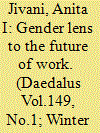

|
|
|
|
|
| Summary/Abstract |
Acquiring new skills will be foundational to surviving in and leading in the workplace of the future. Organizations must make concerted efforts in upskilling women to maintain high levels of productivity and growth. This acquisition of new skills will help women make the transition into new jobs that will be necessary due to automation and today's workplace realities. Without it, the workplace could become even more unbalanced than it is today. Further, today's gaps need to be filled in a holistic manner to ensure that not only are tomorrow's technologies created by a diverse group of people, but also that they are implemented in a human-centered manner that aligns with the original intention. The private sector has a vital role to play in preparing the workforce that it will need and should prototype holistic solutions to help respond to this critical need.
|
|
|
|
|
|
|
|
|
|
|
|
|
|
|
|
| 3 |
ID:
184292


|
|
|
|
|
| Summary/Abstract |
How important is the workplace for employees’ political donations? Contrary to research on workplace political mobilization, existing work assumes that most individual donors contribute ideologically. I link donations of employees and Political Action Committees (PACs) from 12,737 U.S. public companies between 2003 and 2018 to show that 16.7% of employee donations go to employer-PAC-supported candidates. I investigate the dynamics between employee and PAC donations within firm–legislator pairs over time and find that both rank-and-file employees and executives contribute more dollars to company-supported politicians. Firm–employee donation alignment is stronger on powerful and ideologically moderate politicians with high value for the employer. Results from a difference-in-differences design further show modest changes in the partisan composition of employee donations after swift changes in the partisan donations of corporate PACs. The results suggest investment-related rather than ideological motives for alignment and highlight the importance of corporations for money in politics.
|
|
|
|
|
|
|
|
|
|
|
|
|
|
|
|
| 4 |
ID:
121610
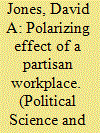

|
|
|
|
|
| Publication |
2013.
|
| Summary/Abstract |
The workplace provides an exceptional outlet for citizens to encounter different viewpoints and discuss politics with people with whom they may disagree. In Washington, DC, however, many people work in partisan environments where like-minded coworkers rarely encounter alternate points of view. Group polarization theory suggests that these environments push individuals to the partisan and ideological extremes. This study tests this hypothesis by comparing opinion change among interns who worked in a partisan workplace with that of interns who were employed in less-partisan environments. The results suggest that partisan workplace environments foster opinion polarization, especially among Republicans.
|
|
|
|
|
|
|
|
|
|
|
|
|
|
|
|
| 5 |
ID:
171118


|
|
|
|
|
| Summary/Abstract |
Sexual harassment is more prevalent for women supervisors than for women employees. This pattern holds in the three countries we studied – the United States, Japan, and Sweden – where women supervisors are between 30 to 100 percent more likely to have been sexually harassed in the last twelve months. Among supervisors, the risk is larger in lower- and mid-level positions of leadership and when subordinates are mostly male. We also find that harassment of women supervisors happens despite their greater likelihood of taking action against the abuser, and that supervisors face more professional and social retaliation after their harassment experience. We conclude that sexual harassment is a workplace hazard that raises the costs for women to pursue leadership ambitions and, in turn, reinforces gender gaps in income, status, and voice.
|
|
|
|
|
|
|
|
|
|
|
|
|
|
|
|
| 6 |
ID:
139300
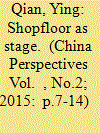

|
|
|
|
|
| Summary/Abstract |
In this paper, I read the play Red Flag Song (1948) as a window into a moment of missed opportunity in China’s revolution, when the Party’s re-engagement with the urban working class could have strengthened democratic tendencies within the Party, and when China’s critical realist literary tradition could have grounded Chinese socialism in the real-life experiences and aspirations of the grassroots. Written at a time when the Party’s control of both industrial and literary productions had begun to tighten, Red Flag Song registered compromise as well as defiance on the shopfloor, and foregrounded two issues as deeply related and fundamental to the making of a New China: work-place democracy as the basis for making China’s working class, and realist literature as a means of understanding complexities and pluralities in social upheavals, and of ensuring a humane and democratic socialism. Unfortunately, the visions Red Flag Song carried were never realised in the following years. They remain unfulfilled promises of the Chinese revolution.
|
|
|
|
|
|
|
|
|
|
|
|
|
|
|
|
| 7 |
ID:
117600
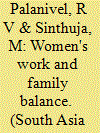

|
|
|
|
|
| Publication |
2012.
|
| Summary/Abstract |
This article aims to assess the ability of formal equal employment opportunity (EEO) programmes and workplace agreement making in India to facilitate work and family balance for women workers. Using documentary analysis and semi-structured interviews in six Indian organisations that are required to develop formal EEO programmes, it is found that formal EEO programmes and agreement making are limited in their ability to promote work and family-friendly arrangements at the workplace. Informal arrangements and managerial discretion remain important in realising work and care balance. The article highlights thus that formal mechanisms alone cannot achieve effective work and care reconciliation for women workers, mainly because they are built upon limited minimum requirements, are voluntary and are dependent upon bargaining processes at the workplace.
|
|
|
|
|
|
|
|
|
|
|
|
|
|
|
|
|
|
|
|
|